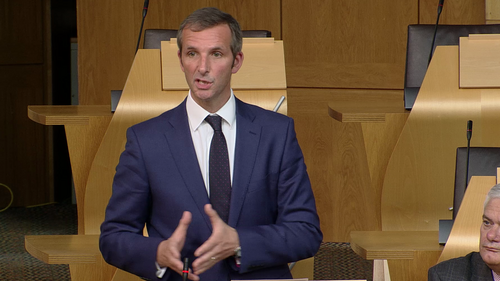Assisted Dying: MSPs hear powerful case from bereaved Scot and Canadian Palliative Care Doctor for changing the law

Tonight Liam McArthur MSP hosted an event in the Scottish Parliament in support of his Assisted Dying for Terminally Ill Adults Scotland Members Bill. At the event MSPs heard powerful testimony from a bereaved Scot and a Canadian Palliative Care Dr who both strongly back a change in the law on assisted dying.
The event took place as a new report ‘Time for Choice the truth about Scotland’s ban on assisted dying and how things could be better’ by Dignity in Dying Scotland, reveals that the average cost for a terminally ill person who decides to travel to Switzerland to end their suffering now sits at £15,000 – a rise of £5,000 since 2018. Research commissioned by Dignity in Dying Scotland reveals that this cost would be unaffordable for 68% of Scots, should they need it.
The report’s findings add weight to the evidence supporting Liam McArthur MSP’s Assisted Dying for Terminally Ill Adults Scotland Bill which would end the current blanket ban on assisted dying and grant terminally ill, mentally competent adults in Scotland the right to a safeguarded and compassionate assisted death if they choose.
Almost 8 out of 10 Scots say they would support the introduction of such a law, with 79% of disabled Scots and 73% of Church of Scotland members in favour.
Liam McArthur MSP said:
"I'd like to thank Stacey Young and Dr James Downar for taking part in this evening's event.
"As the moment for MSPs to vote on my bill draws closer, it is important that everyone has a chance to hear first-hand the stories of those who have witnessed a loved one endure a bad death. These illustrate graphically why the current ban on assisted dying is no longer sustainable and is failing too many Scots.
“Given some of the misinformation we have heard recently about what happens in other parts of the world where such legislation already exists, it is important too that we hear from those directly involved.
"Ultimately, however, we need to find a way forward that is best suited to Scottish circumstances. The proposals I am setting out deliver a safe, compassionate, and robustly safeguarded bill that will legalise assisted dying for terminally ill, mentally competent adults while sitting alongside high-quality end-of-life care.
"My recent consultation showed almost 4 in 5 Scots back my proposals. Despite the best efforts of palliative care, it is clear that the current law in Scotland is not working. In the coming months MSPs will have an opportunity to fix a system that means too often our fellow Scots face a bad death."
Stacey Young, whose mum Zena Miller, from East Lothian, was diagnosed with a rare and aggressive bile duct cancer in 2021 said:
“My mum received fantastic palliative care at home, then in the hospital where she had worked. But it wasn’t able to control all her pain and she endured extreme suffering as she died.”
“Mum was extremely strong-willed and fiercely independent. Two weeks before her death, she said she was ready to go. None of us could have anticipated the suffering, indignity and inhumanity she would endure. For six days she was unable to move or communicate, yet remained conscious. She effectively starved to death. She was skeletal in appearance, literally unrecognisable. My dad and I have PTSD from what we witnessed. I know for certain she would have chosen an assisted death. I wish she had dignity, comfort, and choice. I wish she could have said a proper goodbye”.
Dr James Downar, Professor and Head of the Division of Palliative Care at the University of Ottawa and Critical Care and Palliative Care Physician said:
“I am glad to speak with MSPs about our experience of Medical Assistance in Dying (MAID) in Canada. Even though the law we have there is different in scope to the one proposed for Scotland after seven years, we have a lot of data and we know a lot about the people receiving MAID. In short they are mostly terminally ill people with cancer or neurological conditions such as MND, experiencing intolerable suffering despite receiving palliative care and supportive services.”
“Opponents of assisted dying like to suggest that the law in Canada is misused and open to people experiencing social inequality and as an alternative to palliative care. This couldn’t be further from the truth – in fact people from socially deprived populations are less likely than other Canadians to receive MAID. Since legalizing MAID, the use of palliative care has risen dramatically. Funding for palliative care services and home care has also risen, and my division of palliative care has nearly doubled in size. Parliament has also passed a national disability benefit- the first of its kind in Canada.”